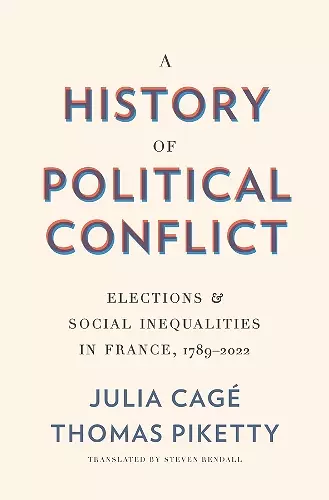A History of Political Conflict
Elections and Social Inequalities in France, 1789–2022
Thomas Piketty author Julia Cagé author Steven Rendall translator
Format:Hardback
Publisher:Harvard University Press
Publishing:26th Sep '25
£62.95
This title is due to be published on 26th September, and will be despatched as soon as possible.

A pioneering history of voting and inequality, drawing on an unprecedented data set covering more than two centuries of sociological findings.
Who votes for whom and why? Julia Cagé and Thomas Piketty comb through more than two hundred years of data from some 36,000 French municipalities to show how inequality has shaped the formation of political coalitions, with stark consequences for economic and political development.
Cagé and Piketty argue that today’s tripartite division of French political life—a competition among a bourgeois central bloc and distinct factions of the urban and rural working classes—has a precise, and revealing, historical analogue. To understand contemporary tensions, we can look to the end of the nineteenth century and the beginning of the twentieth, another period when runaway economic inequality produced such a three-way rivalry. Cagé and Piketty show that tripartition has always been unstable, whereas the binary political conflict enabled by relative equality and typical of most of the twentieth century facilitated social and economic progress. Comparing these configurations over time helps us envisage possible trajectories for the French political system in the coming decades.
With its many changes in governmental structure since 1789, France is an ideal laboratory for studying the vicissitudes of modern political life in general, and electoral democracy in particular. Using France as a model, A History of Political Conflict offers a powerful framework for understanding the complex project of building and sustaining democratic majorities.
A bold undertaking [that] will undoubtedly fuel political and social debate… A key concept highlighted as a determinant of voting is geosocial class, defined as… a cross-referencing of socioeconomic data and location within the territory.… Through the systematic use of this approach, [Cagé and Piketty] reach conclusions that contradict current political discourse. They make clear, in particular, that variables linked to geosocial class are far more important than those relating to religion and foreign origin. -- Le Monde
The methodology, based on electoral and social data from 36,000 communes, allows for finer, more reliable comparisons than post-electoral polls… The data is clear, the authors argue: the popular base of the Left is much stronger than is often claimed. -- L’Obs
In a work of significant scientific importance, economists Julia Cagé and Thomas Piketty skillfully blend politics and history, sociology, economics, and geography. An intersection of ideas from which several surprising insights emerge to illuminate the major issues at stake today. -- Marianne
One can only be amazed by the scale, at once surgical and monumental, of this study of the shifting and complex links between the French vote since 1789 and the social and geographical status of voters.… A History of Political Conflict will provide food for thought for political leaders of all stripes for years to come. -- Télérama
Aims to enlighten every citizen on what has been driving political conflict in France since the Revolution.… Precise, well-documented, and analytical as the book is, it is also a work of intervention, in the sense that its analyses are intended as a possible way of reinventing a left-wing program, making it more attentive to economic justice and inequalities. -- Les Inrockuptibles
ISBN: 9780674248434
Dimensions: 235mm x 156mm x 41mm
Weight: 1587g
848 pages